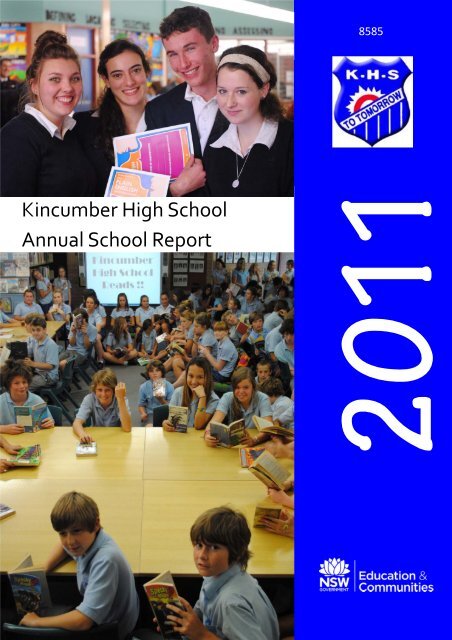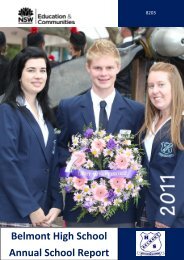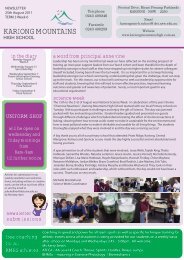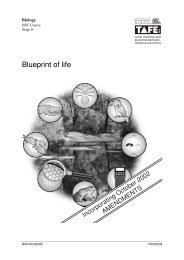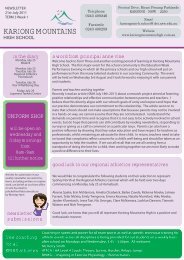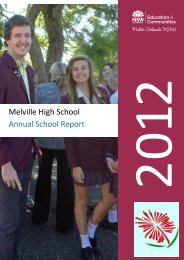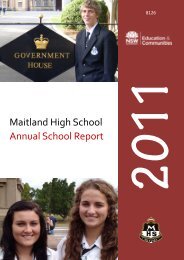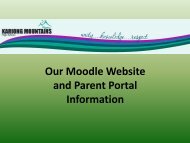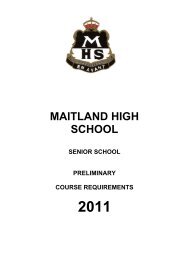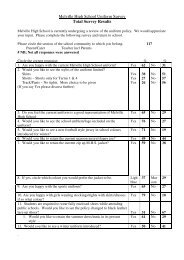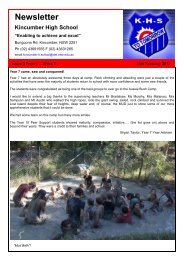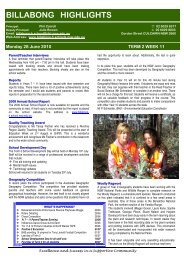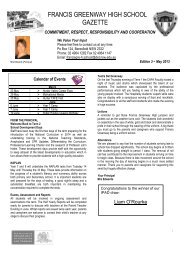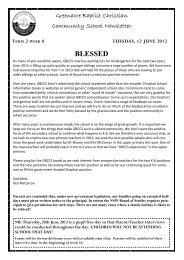Annual School Review - Kincumber High School
Annual School Review - Kincumber High School
Annual School Review - Kincumber High School
Create successful ePaper yourself
Turn your PDF publications into a flip-book with our unique Google optimized e-Paper software.
<strong>Kincumber</strong> <strong>High</strong> <strong>School</strong><br />
<strong>Annual</strong> <strong>School</strong> Report<br />
8585
Our school at a glance<br />
Students<br />
<strong>Kincumber</strong> <strong>High</strong> <strong>School</strong> is a coeducational,<br />
comprehensive secondary school proudly<br />
serving the Central Coast. The school’s<br />
mission is to “achieve and excel” and our<br />
strong welfare programs support a friendly<br />
and inclusive student body.<br />
In 2011 the student population was 933<br />
including 45 students in the Student Support<br />
Unit. Support students are highly integrated<br />
across the school and make a considerable<br />
contribution to the social fabric of our school.<br />
The school is also proud to have an<br />
Aboriginal enrolment of 60 students.<br />
KHS has a strong academic emphasis and a<br />
well-deserved reputation for sporting<br />
prowess. In addition, music, the visual and<br />
performing arts, community service and<br />
leadership programs are all strong as you will<br />
read about in this report.<br />
Staff<br />
In 2011, there were 68.7 teaching positions at<br />
the school. This included 13 executive<br />
positions, 5.8 teachers in the support unit and<br />
4 specialist staff. The teaching staff was<br />
supported by 16.9 administrative staff<br />
including the Farm Assistant and the General<br />
Assistant.<br />
The school has a diverse and committed staff<br />
with a good balance of new enthusiasm and<br />
experienced teachers. They are a dedicated<br />
and professional team as is the office staff<br />
who also make a huge contribution to school<br />
life.<br />
Significant programs and<br />
initiatives<br />
<strong>Kincumber</strong> <strong>High</strong> <strong>School</strong> offers a large range<br />
of programs and initiatives to cater for the<br />
broad range of students who attend our<br />
comprehensive high school. Whilst the<br />
following list is not exhaustive, it does give an<br />
indication of the extent of the extra-curricular<br />
activities on offer:<br />
1. Student volunteer program<br />
2. Student leadership opportunities including<br />
peer support, Max Potential and student<br />
led assemblies<br />
3. <strong>Kincumber</strong> Learning Community and<br />
associated strong transition program<br />
4. Premiers Reading and Sporting<br />
Challenges<br />
5. Gifted and Talented programs including the<br />
debating teams and Youth of the Year<br />
6. Formation of our own AECG<br />
7. Community service programs such as<br />
Blood donors and<br />
8. Plan-It-Youth mentoring<br />
9. Transition to Work program<br />
10 Young Men’s and Women’s groups<br />
11 Anti-bullying programs including the antibullying<br />
boot camp<br />
12. Peer mediation program<br />
13 Talented musician programs including<br />
Artist-in-Residence and Lizotte’s<br />
These programs and initiatives, a number of<br />
which are in partnership with our partner<br />
primary schools who collectively form our<br />
Kincumba Learning Community along with<br />
other community groups, provide a strong<br />
platform for the growth toward maturity of our<br />
adolescent population. The school prides<br />
itself on the work we do in developing not just<br />
the academic side of our students, but their<br />
growth as strong community minded citizens.<br />
Student achievement in 2011<br />
The strategies embedded in our 2008 to 2011<br />
<strong>School</strong> Management Plan, particularly in<br />
relation to quality teaching and learning are<br />
really starting to bear fruit. 2011 saw the<br />
strongest HSC results we have had at the<br />
school for many years with 16 Band 6 results<br />
across eight subjects, nominations for<br />
InTech, ArtExpress and Encore and 41 of our<br />
students receiving university placement<br />
across a range of professions. The work<br />
being put into our junior classes particularly in<br />
1
elation to literacy, numeracy and<br />
engagement indicate that these improved<br />
results will continue into the future.<br />
Messages<br />
Principal’s message<br />
2011 was a very good year at <strong>Kincumber</strong><br />
<strong>High</strong> <strong>School</strong>. Our HSC cohort managed some<br />
of the best results we’ve had in years. Our<br />
student leadership program is allowing some<br />
very talented students the chance to really<br />
contribute to the fabric of the school. Our<br />
community service programs are allowing<br />
many students to become involved and<br />
develop as great citizens. The student<br />
volunteer program in particular was very<br />
successful in 2011. Our focus on gifted and<br />
talented students resulted amongst other<br />
achievements in our Year 8 debating team<br />
defeating all opponents on the Central Coast<br />
and moving on to the State finals held at<br />
Sydney University. As ever, our sporting<br />
successes are almost too many to list and our<br />
musicians and artists are excelling in a<br />
number of forums. More details about each of<br />
these areas are contained in reports<br />
throughout this ASR.<br />
I would like to take this opportunity to thank<br />
the many dedicated teachers at KHS for the<br />
time and effort they put into their work. These<br />
efforts are clearly appreciated by our<br />
community with almost a third of the staff<br />
receiving nominations for the school’s<br />
Excellence in Teaching Award for 2011, an<br />
award sponsored by our P & C.<br />
I certify that the information in this report is<br />
the result of a rigorous school self-evaluation<br />
process and is a balanced and genuine<br />
account of the school’s achievements and<br />
areas for development.<br />
Mark Macaulay, Principal<br />
P&C and/or <strong>School</strong> Council<br />
message<br />
2011 saw three new committee members<br />
Lorraine McGee - Vice President, Jason Kent<br />
- Treasurer and Colin Ramsden - Grounds. It<br />
was encouraging to see some new<br />
enthusiastic members.<br />
Colin Ramsden was instrumental in<br />
organising quotes and the installation of air<br />
conditioners in PDHPE, HSIE and the staff<br />
common room with a cost of $7000. Colin<br />
also did the extensive repair of the lighting in<br />
the school hall and organised the repairing,<br />
cleaning and rehanging of the stage curtains.<br />
The Year 7 orientation night was a big<br />
success with Jason Kent organising and<br />
selling the book packs, Colin Ramsden on the<br />
BBQ and the sale of school uniforms by<br />
Lowes giving us $3165.80.<br />
Kerrie O'Heir, our invaluable secretary,<br />
volunteered her time to assist with<br />
establishing a new Antibullying Policy which<br />
is now in place. Kerrie was also on the<br />
interviewing panel for the new Head Teacher<br />
CAPA, Mrs Carol Brady.<br />
Our guest speaker was Denise Lynch<br />
<strong>Kincumber</strong> <strong>High</strong> <strong>School</strong> (KHS) Police <strong>School</strong><br />
Liaison Officer. It was interesting to hear the<br />
involvement she has at our school in<br />
educating our students.<br />
The KHS newsletter this year is now being<br />
distributed by e-mail to the Kincumba<br />
Learning Community which includes Avoca<br />
Beach, Copacabana, Pretty Beach and<br />
<strong>Kincumber</strong> Primary <strong>School</strong>s. This enables us<br />
to advertise what an exceptional school KHS<br />
is. The P&C has also supported its students’<br />
endeavors giving out $1950. We allocate<br />
$150 to individual student applications and<br />
$400 to teams who represent our school and<br />
meet our criteria.<br />
I was fortunate to be able to trial the new<br />
parent portal through the Millennium System.<br />
This enabled me to access my child’s<br />
information through my home computer such<br />
as test results and absenteeism. This system<br />
should be up and running for all parents to<br />
access in 2012. I was also on the interviewing<br />
panel for four teachers. This was very<br />
interesting and gave me some insight into the<br />
high quality of teachers that we have at KHS.<br />
2
The P&C would also like to thank Beverley<br />
Sampford (Relieving Principal) for her support<br />
in 2011.<br />
I would like to invite families old and new to<br />
attend our P&C meetings held on the third<br />
Tuesday of the month (except school<br />
holidays) at 7pm in the staff common room.<br />
The meetings help you to keep informed and<br />
involved in what is happening within your<br />
school community.<br />
Sonya Rowcliff, P&C President<br />
Student representative’s<br />
message<br />
The <strong>Kincumber</strong> <strong>High</strong> <strong>School</strong> class of 2011<br />
was an exceptional group of students. The<br />
leadership team of Jessica Cairncross (Girls<br />
Captain), Joshua Favaloro (Boys Captain),<br />
Jade Condon (Girls Sport Captain) and Mitch<br />
Farag (Boys Sport Captain) supported by the<br />
whole year set a positive example for all of<br />
the students at <strong>Kincumber</strong> <strong>High</strong>. Their<br />
fundraising efforts supported both the school<br />
and the greater community. Furthermore, the<br />
positive effect the school captains had as<br />
leaders and the standards they modelled no<br />
doubt contributed to the best HSC results for<br />
some time from this group as explained<br />
elsewhere in this report.<br />
Beyond the scope of academia, the cohort<br />
was represented in State sporting teams,<br />
National Art and Photography competitions,<br />
and at the highest level in the State in the<br />
Creative and Performing Arts. Leadership<br />
was not just the domain of our elected<br />
leaders but was demonstrated by many of our<br />
Year 12’s in 2011.<br />
involvement of Year 12 in their final weeks of<br />
school. From slave auctions to the traditional<br />
breakfast BBQ, and the inaugural slip ‘n’ slide<br />
afternoon, the KHS class of 2011 showed<br />
their spirit and school leadership by<br />
participating in celebrations that were fun,<br />
inspirational, and not in any way disruptive or<br />
harmful to others.<br />
It was truly an honour and a privilege to be<br />
involved with such a great group of young<br />
men and women for the past six years. We<br />
are sending some great leaders out into the<br />
community.<br />
Grant Bradshaw, Year Adviser<br />
<strong>School</strong> context<br />
Student information<br />
It is a requirement that the reporting of<br />
information for all students must be<br />
consistent with privacy and personal<br />
information policies.<br />
Student enrolment profile<br />
Gender 2007 2008 2009 2010 2011<br />
Male 589 548 540 529 493<br />
Female 461 456 444 448 409<br />
The gender imbalance that existed in the past<br />
is correcting. In fact the male to female ratio<br />
is close to 1:1 in the Year 7 group, and it is<br />
anticipated that the 2012 Year 7 will have<br />
more girls than boys.<br />
Student attendance profile<br />
100<br />
Student attendance rates<br />
Perhaps the most satisfying achievement of<br />
Year 12 2011, however, was something much<br />
more intangible. The spirit and camaraderie<br />
shown by the entire group throughout their six<br />
years at KHS, and especially in their final<br />
year, culminated with the most enjoyable<br />
trouble free celebrations ever seen at<br />
<strong>Kincumber</strong> <strong>High</strong>. The whole school<br />
community was impressed with the positive<br />
Attendance rate<br />
75<br />
50<br />
25<br />
0<br />
2008 2009 2010 2011<br />
Year<br />
<strong>School</strong> Region State DEC<br />
3
Whilst attendance rates have hovered a<br />
fraction below both region and State in the<br />
past, improvement has now seen KHS<br />
exceed the regional rate in 2011 with a goal<br />
of bettering the State average by 2012.<br />
Management of non-attendance<br />
Our centralised student learning and<br />
administration system now allows us to track<br />
student attendance in real time. Rolls are<br />
marked electronically each period so that<br />
fractional truancy is easy to track and in fact,<br />
fractional truancy rates have been<br />
dramatically reduced. SMS messages are<br />
sent each day to the families of those<br />
students not at school.<br />
Retention to Year 12<br />
Retention to Year 12 (SC to HSC)<br />
80.0<br />
60.0<br />
40.0<br />
20.0<br />
0.0<br />
SC05‐HSC07 SC07‐HSC09 SC09‐HSC11<br />
<strong>School</strong> SEG State<br />
As this graph clearly illustrates, KHS enjoys<br />
retention rates well above both State and<br />
SEG averages.<br />
Post-school destinations<br />
Of the 2011 Year 12 cohort 41 were<br />
successful in gaining entry to a University<br />
course, with three scholarships being<br />
awarded. This is a significant improvement on<br />
the previous year. Many of the remaining<br />
students have pursued trades courses. The<br />
number taking a ‘gap’ year, with the intention<br />
of working to save for overseas travel and<br />
perhaps study in 2013 has also increased.<br />
Collection of data aggregated over five<br />
previous years has produced the following<br />
information.<br />
University 26% (in 2011 this was 35%)<br />
TAFE 21%<br />
Full Time Work 17%<br />
Part Time Work 11%<br />
The balance is spread between<br />
apprenticeships, traineeships and private<br />
college.<br />
Year 12 students undertaking<br />
vocational or trade training<br />
Over 40 TVET courses were available to<br />
senior students in 2011 with 72 students<br />
completing courses run by Gosford,<br />
Ourimbah or Wyong TAFEs. Students who<br />
participated in these courses gained a TAFE<br />
qualification and the skills that go with it, as<br />
well as having the course count towards their<br />
Preliminary Certificate or HSC. These<br />
students benefit greatly from their willingness<br />
to extend themselves well beyond the<br />
traditional boundaries of school life and are to<br />
be commended for their commitment and<br />
enthusiasm.<br />
Year 12 students attaining HSC or<br />
equivalent vocational educational<br />
qualification<br />
Of the 121 students in Year 12 all obtained<br />
the HSC.<br />
Staff information<br />
It is a requirement that the reporting of<br />
information for all staff must be consistent<br />
with privacy and personal information<br />
policies.<br />
Staff establishment<br />
Position<br />
Number<br />
Principal 1<br />
Deputy Principal(s) 2<br />
Head Teachers 12<br />
Classroom Teachers 45<br />
Teacher of Students with Disabilities 5<br />
Careers Adviser 1<br />
Support Teacher Learning 1<br />
Teacher Librarian 1<br />
Counsellor 1<br />
<strong>School</strong> Administrative & Support 17<br />
Total 86<br />
The school has a strong Aboriginal<br />
community and several staff members have<br />
identified as of Aboriginal descent.<br />
‘GAP’ year 4-5% (in 2011 approx 9%)<br />
4
Staff retention<br />
There is a very high staff retention rate. By<br />
the end of 2011, we had lost two staff due to<br />
a decline in staffing entitlement, one to<br />
transfer and one to retirement.<br />
Teacher qualifications<br />
All teaching staff meet the professional<br />
requirements for teaching in NSW public<br />
schools.<br />
Qualifications<br />
Degree or Diploma 100<br />
Postgraduate 5<br />
Financial summary<br />
% of staff<br />
This summary covers funds for operating<br />
costs and does not involve expenditure areas<br />
such as permanent salaries, building and<br />
major maintenance.<br />
Financial Summary as at<br />
1/12/2010<br />
Income<br />
Balance brought forward<br />
568,780.26<br />
Global funds 542,375.80<br />
Tied Funds 244,181.67<br />
<strong>School</strong> and community sources 290,546.71<br />
Interest 34,453.15<br />
Trust receipts 50,358.83<br />
Total Income 1,730,696.42<br />
Expenditure<br />
Teaching and learning<br />
Key Learning Areas 159,193.95<br />
Library 10,729.04<br />
Excursions 79,750.29<br />
Extra Curricula 139,978.00<br />
Professional Learning 2,444.57<br />
Tied Funds 255,598.21<br />
Short Term Relief 164,002.40<br />
Administrative Programs<br />
Administration and Office 127,385.73<br />
Utilities 105,604.21<br />
Maintenance 57,992.90<br />
Trust Payments 52,801.07<br />
Total Capital Programs 7,969.51<br />
Total Payments 1,163,449.88<br />
Balance Carried Forward 567,246.54<br />
parent body. Further details concerning the<br />
statement can be obtained by contacting the<br />
school.<br />
<strong>School</strong> performance 2011<br />
Achievements<br />
CAPA<br />
2011 was a year of outstanding<br />
achievements for our CAPA faculty. In Dance<br />
we entered five different groups into the<br />
Central Coast Dance Festival, and had 24<br />
talented students audition for and be<br />
accepted into the Hunter / Central Coast Star<br />
Struck Spectacular. Much of the<br />
choreography was done by our very capable<br />
senior dance students.<br />
In Photography KHS students took out 1 st , 3 rd ,<br />
4 th , 5 th and 20 th in the nationwide My Region<br />
Photography competition. This was from<br />
thousands of photos submitted Australia<br />
wide. Congratulations to Joshua Favaloro,<br />
our 2011 <strong>School</strong> Captain, who took out first<br />
prize.<br />
In Visual Art, two KHS students achieved<br />
Band 6 results and two major works were<br />
nominated for inclusion in Art Express. A<br />
series of drawings by Gabi Jackson was<br />
selected for inclusion, and the other work, a<br />
portrait by Jordan Richardson won 1st prize,<br />
the prestigious Russ Graham Memorial<br />
Award at the Central Vision Exhibition at<br />
Gosford Regional Gallery.<br />
In Music, Jessie O’Neill-Hutchin was first<br />
nominated for Encore then accepted into the<br />
final 16 in the State to perform at the Sydney<br />
Opera House. We had several Band 6 HSC<br />
results. As in previous years, our Evening at<br />
Lizotte’s showcased the incredible depth of<br />
music talent at our school. Our students also<br />
performed at the YIPA (Youth in Performing<br />
Arts) and Central Coast Showcase concerts.<br />
A full copy of the school’s 2011 financial<br />
statement is tabled at the <strong>Annual</strong> General<br />
Meetings of the <strong>School</strong> Council and/or the<br />
5
English<br />
In 2011 the HSC results for English were<br />
once again very favourable. Most students<br />
achieved their most positive outcome in this<br />
subject. On a “within school comparison”<br />
English was the best performing faculty. The<br />
attendance of students at successive study<br />
days organised by the English Teachers’<br />
Association proved very valuable, as HSC<br />
markers for each section of the examination<br />
explained what was required. This translated<br />
into improved outcomes.<br />
A particular success in the faculty was<br />
achieved by the Year 8 debating team,<br />
coached by Mrs Kay. The girls - Elizabeth<br />
Jones, Olivia Bayliss, Lily Hayward and<br />
Tahlia Mathieson - won the zone and regional<br />
finals of the Premier’s Debating Challenge<br />
overcoming all opponents, including those<br />
from selective schools. The girls then went<br />
on to contest the State finals in Sydney where<br />
their skill and determination was apparent.<br />
Their success is even more admirable when it<br />
is realised that each debate involved an<br />
“unseen” topic, which was issued to them one<br />
hour before the debate. The girls then had to<br />
prepare their case and argue it involving a<br />
speech of eight minutes for each participant!<br />
Various enrichment activities were organised<br />
by the faculty including entries in the “Write<br />
Now”, “Heywire” and “What Matters”<br />
competitions for talented writers. Students<br />
also participated in a Teen Masterclass<br />
writing workshop at the State Library,<br />
attended a performance of “The Cherry<br />
Orchard” at Parramatta, participated in the<br />
Model United Nations Program and in the<br />
Gosford Mock Council.<br />
Sport<br />
Just as it always has, sport plays a large role<br />
in the life of KHS and our students are quite<br />
gifted. No less than 35 students represented<br />
at Sydney North Regional level across a<br />
range of sports, and 10 of these students<br />
went onto State representation in cricket,<br />
water polo, rugby, swimming, athletics and<br />
cross-country. Two students, Lily Bardsley<br />
and Nick Reekie, received Regional Blues in<br />
Cricket and Swimming respectively, and<br />
Mitch Farag received a Blue Endorsement.<br />
Academic<br />
In the National Assessment Program, the<br />
results across the Years 3, 5, 7 and 9 literacy<br />
and numeracy assessments are reported on<br />
a scale from Band 1 to Band 10.<br />
The achievement scale represents increasing<br />
levels of skills and understandings<br />
demonstrated in these assessments.<br />
Year 3: from Band 1 (lowest) to Band 6<br />
(highest for Year 3)<br />
Year 5: from Band 3 (lowest) to Band 8<br />
(highest for Year 5)<br />
Year 7: from Band 4 (lowest) to Band 9<br />
(highest for Year 7)<br />
Year 9: from Band 5 (lowest) to Band 10<br />
(highest for Year 9)<br />
and/or<br />
In the <strong>School</strong> Certificate the performance of<br />
students is reported in performance bands<br />
ranging from Performance Band 1 (lowest) to<br />
Performance Band 6 (highest).<br />
6
Literacy – NAPLAN Year 7<br />
Literacy – NAPLAN Year 9<br />
40<br />
Percentage in bands:<br />
Year 7 Reading<br />
40<br />
Percentage in bands:<br />
Year 9 Reading<br />
Percentage of students<br />
30<br />
20<br />
10<br />
Percentage of students<br />
30<br />
20<br />
10<br />
0<br />
4 5 6 7 8 9<br />
Bands<br />
Percentage in Bands<br />
<strong>School</strong> Average 2008‐2011<br />
SSG % in Band 2011<br />
State DEC % in Band 2011<br />
Whilst the Year 7 cohort was a little below<br />
State DEC averages for the top band, overall<br />
they scored above both SSG and State DEC<br />
scores for reading, writing, spelling and<br />
grammar.<br />
Numeracy – NAPLAN Year 7<br />
40<br />
Percentage in bands:<br />
Year 7 Numeracy<br />
0<br />
Years 9 scored above both SSG and State<br />
DEC averages for reading (graph above) and<br />
grammar, but were a shade below in spelling<br />
and writing. The school’s literacy team is well<br />
aware of this and is orchestrating strategies<br />
across all KLA’s to redress this result.<br />
Numeracy – NAPLAN Year 9<br />
40<br />
5 6 7 8 9 10<br />
Bands<br />
Percentage in Bands<br />
<strong>School</strong> Average 2008‐2011<br />
SSG % in Band 2011<br />
State DEC % in Band 2011<br />
Percentage in bands:<br />
Year 9 Numeracy<br />
Percentage of students<br />
30<br />
20<br />
10<br />
Percentage of students<br />
30<br />
20<br />
10<br />
0<br />
4 5 6 7 8 9<br />
Bands<br />
Percentage in Bands<br />
<strong>School</strong> Average 2008‐2011<br />
SSG % in Band 2011<br />
State DEC % in Band 2011<br />
As with literacy, whilst the Year 7 group was<br />
a little below State average for the top band,<br />
their average numeracy score still exceeded<br />
both SSG and State DEC averages.<br />
0<br />
5 6 7 8 9 10<br />
Bands<br />
Percentage in Bands<br />
<strong>School</strong> Average 2008‐2011<br />
SSG % in Band 2011<br />
State DEC % in Band 2011<br />
Our average numeracy score exceeded the<br />
SSG average, but still lagged behind the<br />
State DEC average. This is a pity as we<br />
exceeded State averages substantially in<br />
both Bands 8 and 9, but fell short in Band 10.<br />
7
<strong>School</strong> Certificate<br />
An analysis of our <strong>School</strong> Certificate results<br />
shows that we are above both SSG and State<br />
DEC averages in English, History and<br />
Computer Skills, roughly equal with State<br />
average in Science, and a bit below in Maths<br />
and Geography<br />
<strong>School</strong> Certificate relative<br />
performance comparison to Year 5<br />
(value-adding)<br />
Percentage of students<br />
Percentage of students<br />
4<br />
2<br />
0<br />
‐<br />
2<br />
‐<br />
4<br />
Percentage of students in performance<br />
bands: <strong>School</strong> Certificate English<br />
60<br />
50<br />
40<br />
30<br />
20<br />
10<br />
0<br />
1 2 3 4 5 6<br />
Bands<br />
Percentage in Bands<br />
<strong>School</strong> Average 2007‐2011<br />
SSG % in Band 2011<br />
State DEC % in Band 2011<br />
<strong>School</strong> Certificate: Relative performance<br />
from Year 5 (value‐added)<br />
English<br />
Mathematics<br />
Science<br />
AHC&C<br />
AGC&C<br />
<strong>School</strong> 2011<br />
<strong>School</strong> Average 2007‐2011<br />
SSG Average 2011<br />
Computer Skills<br />
results in past years. Our improvement rates<br />
are well above SSG averages in English,<br />
Science and History and with the exception of<br />
Geography, exceed our past performance in<br />
all other areas. Given the current focus on<br />
teaching and learning across the school,<br />
there is no reason to believe why these<br />
results won’t continue to improve in the years<br />
ahead.<br />
<strong>High</strong>er <strong>School</strong> Certificate<br />
Whilst our top end HSC results were the best<br />
for quite a while, overall results were not<br />
significantly better than previous years. Of the<br />
31 subjects where information is available,<br />
results exceeded the last four year school<br />
average in 15 subjects. Indications are that<br />
greatly improved student engagement<br />
amongst the current Stage 4 and 5 cohorts<br />
should see substantial improvement in overall<br />
HSC results in years ahead.<br />
<strong>High</strong>er <strong>School</strong> Certificate relative<br />
performance comparison to <strong>School</strong><br />
Certificate (value-adding)<br />
Performance Band<br />
Low<br />
Middl<br />
e<br />
Hig<br />
h<br />
<strong>School</strong> 2011 -5.1 -5.4 -3.3<br />
<strong>School</strong> Average<br />
2007-2011 -0.8 -1.9 -1.9<br />
SSG Average 2011 0.5 0.5 -2.5<br />
Yet again a high retention rate together with a<br />
cohort that whilst sitting an ATAR based<br />
course were not in the main interested in<br />
pursuing a university course has combined to<br />
produce less than satisfactory value added<br />
data. This situation is however at odds with<br />
the fact that 41 of this cohort were successful<br />
in gaining first round university offers.<br />
Improved value added remains a goal in the<br />
2012 – 2014 management plan.<br />
This table clearly illustrates that we are<br />
making big improvements on our average<br />
8
Minimum standards<br />
The Commonwealth Government sets<br />
minimum standards for reading, writing,<br />
grammar and punctuation, spelling and<br />
numeracy for Years 3, 5, 7 and 9.<br />
The performance of the students in our<br />
school in the National Assessment Program –<br />
Literacy and Numeracy is compared to these<br />
minimum standards. The percentages of our<br />
students achieving at or above these<br />
standards are reported below.<br />
mighty effort by these students, and their<br />
English teachers who supported and<br />
encouraged them.<br />
Percentage of Year 7 students achieving<br />
at or above minimum standard (exempt<br />
students excluded)<br />
Reading 100.0<br />
Writing 96.0<br />
Spelling 96.8<br />
Grammar & Punctuation 97.6<br />
Numeracy 99.2<br />
Percentage of Year 9 students achieving<br />
at or above minimum standard (exempt<br />
students excluded)<br />
Reading 97.0<br />
Writing 80.5<br />
Spelling 95.3<br />
Grammar & Punctuation 91.2<br />
Numeracy 96.4<br />
Due to the presence of a school support unit,<br />
tables with exempt students excluded have<br />
been used.<br />
Significant programs and<br />
initiatives<br />
Premiers Reading Challenge<br />
A record 99 out of 129 Year 7 students,<br />
including those from the Student Support<br />
Unit, completed the Premier’s Reading<br />
Challenge in 2011 representing 76% of Year<br />
7.<br />
Each participating class went to the Library<br />
for a weekly PRC lesson where they read,<br />
selected what they would be reading next,<br />
entered their books onto their own record on<br />
the PRC website or discussed and shared<br />
what they had read. To complete the<br />
Challenge students must have read at least<br />
20 books, 15 of which are from the PRC lists.<br />
The PRC process is long one and it is a<br />
Premiers Volunteer Challenge<br />
Students in this program raised awareness of<br />
various causes and gathered funds to support<br />
charitable organisations and related appeals<br />
by volunteering in aged care facilities,<br />
disability units, primary schools and within<br />
their own school. They helped in the nursing<br />
home, fed the homeless and assisted with<br />
reading programmes in our local primary<br />
school. Many students also took part in the<br />
World Vision 40 Hour Famine where they<br />
raised over $5000. Our local federal member<br />
made a special trip to the school to<br />
acknowledge their outstanding contribution.<br />
<strong>Kincumber</strong> <strong>High</strong> has always been a generous<br />
school. The ability of our students to<br />
empathise and to give to charity has been a<br />
feature of school life. However, in 2011 they<br />
have surpassed all previous efforts and are<br />
changing the fabric of the school community<br />
which now has a reputation for empathy and<br />
social justice.<br />
Kincumba Learning Community<br />
The Kincumba Learning Community is built<br />
on a strong partnership between <strong>Kincumber</strong><br />
<strong>High</strong> <strong>School</strong> and four primary schools in the<br />
local area: Avoca Beach Public, Copacabana<br />
Public, <strong>Kincumber</strong> Public and Pretty Beach<br />
Public. We work closely to create a focus on<br />
student learning and positive outcomes for<br />
all.<br />
Our well-established transition programs<br />
mean that students enter new environments<br />
settled, confident and ready to learn. Values<br />
9
education across all schools creates an<br />
atmosphere of mutual respect, acceptance,<br />
compassion, tolerance and the pursuit of<br />
excellence. Indigenous students’<br />
backgrounds and cultural practices are<br />
respected and celebrated through programs<br />
promoting connectedness and inclusivity.<br />
The Kincumba Learning Community<br />
continued to have an impact on teaching and<br />
learning as the close bonds between schools<br />
enable more cohesive planning and<br />
information sharing. In 2011, we focussed on<br />
4 main areas.<br />
Leadership: Each school sent a team to<br />
leadership training over two terms to look at<br />
best practice in planning for school<br />
improvement using data analysis to identify<br />
patterns of strength and areas of concern,<br />
planning scaffolds for engaging all staff in the<br />
school improvement cycle and rigorous<br />
evaluation of existing programs. As a result,<br />
school management plans have been<br />
strengthened and aligned.<br />
Transition 6/7: Throughout the year there<br />
are numerous joint high school / partner<br />
primary school activities including Assembly<br />
performances, Anti-bullying Boot Camp and<br />
Gifted and Talented workshops in Visual Art<br />
and Science. Again the results of this can be<br />
seen in how quickly and confidently students<br />
adjust to high school and get on with their<br />
learning.<br />
Aboriginal education: Across the learning<br />
community a team has developed an<br />
Aboriginal Action Plan for implementation in<br />
2012 in partnership with the newly formed<br />
local Tjudibaring Aboriginal Education<br />
Consultative Group (AECG). Included in this<br />
plan are stronger mentoring links from<br />
primary to high school, ongoing joint<br />
participation in the 5 Lands Walk and other<br />
reconciliation activities and strong<br />
Personalised Learning Plans from K to 12.<br />
Antibullying plans: Building on the ‘bully<br />
proofing’ activities of the 6/7 transition<br />
program, the school Antibullying plan was<br />
reviewed and strengthened in consultation<br />
with teachers, students and parents from the<br />
P&C. Alignment with primary school plans<br />
mean that students get a consistent message<br />
about prevention, reporting and<br />
consequences across the school community.<br />
Teachers participated in a joint staff<br />
development day at the end of the year to<br />
look at issues around social media, online<br />
learning and gaming and cyber bullying to<br />
find ways to maximise learning and minimise<br />
risk in Cyber Savvy – Cyber Safe training.<br />
Directions for 2012 include adding a new<br />
focus area in numeracy to the Kincumba<br />
Learning Community agenda and the<br />
<strong>Kincumber</strong> Numeracy Intervention team<br />
(KNIT) are already working to develop an<br />
action plan in this area.<br />
<strong>School</strong> to Work – Careers Education<br />
A wide range of career related activities<br />
occurs at the school under the banner of<br />
<strong>School</strong> to Work. This includes Work Studies<br />
classes in Years 11 and 12 and Careers<br />
classes for all Year 9 and Year 10 students. A<br />
‘Work Ready’ program was conducted for all<br />
VET students in Years 11 and 12. Once<br />
again the school had a high participation rate<br />
in work experience and work placement with<br />
over 200 students involved in 2011.<br />
.A variety of excursions and experiences<br />
enabled many students to explore post<br />
school options first hand. Examples of these<br />
include the Central Coast Careers Expo,<br />
Meet A Keeper, Health careers at Gosford<br />
Hospital, the SMH Careers Expo in Sydney<br />
and visits to the Newcastle Careers<br />
Reference Centre, Engineering Summer<br />
<strong>School</strong>, Designer for a Day and a range of<br />
specialist faculty days at a number of Sydney<br />
universities. Registered training courses<br />
organised by the Careers Dept. continued to<br />
prove popular with 72 students gaining their<br />
OH&S ‘White card’, 51 the RSA and 48 the<br />
RCG certificates. 47 students also gained<br />
their Senior First Aid Certificate.<br />
10
Plan‐It‐Youth<br />
This exceptional mentoring program has<br />
continued to benefit Year 10 students who<br />
may be at risk of leaving school early or<br />
simply in need of adult support and guidance.<br />
The enormous contribution of the trained<br />
adult community members who give of their<br />
time so generously is much appreciated –<br />
especially by the students who participate in<br />
the program.<br />
In many cases the individualised special<br />
attention given by the mentors each week to<br />
young people in need makes a huge<br />
difference. In 2011, 24 Year 10 students<br />
gained from their participation in this<br />
program.<br />
Progress on 2011 targets<br />
2011 was the third year of an ambitious three<br />
year management plan. There is no doubt<br />
that the school has achieved significant<br />
progress over this time. Staff are now<br />
focused on their teaching, students are in<br />
uniform, in class and for the most part<br />
seriously engaged in their learning. Both<br />
anecdotal and data driven evidence show<br />
that the school is enjoying improving<br />
academic results and a climate where<br />
learning is now a key goal for just about every<br />
student.<br />
Target 1<br />
Increased student engagement in Years 11<br />
and 12<br />
Our achievements include:<br />
<br />
The highest number of Band 6 results for<br />
many years.<br />
Nominations for InTech, ArtExpress and<br />
Encore, and 41 first round university<br />
offers.<br />
Increased interest from our senior<br />
students in applying for leadership<br />
positions within the school.<br />
Target 2<br />
To improve Year 9 literacy (with a focus<br />
on writing and spelling)<br />
Year 9 reading results above both the<br />
SSG and State DEC averages and<br />
significantly above SSG results in the top<br />
three bands as well as being above SSG<br />
and State DEC averages for Grammar<br />
and Punctuation. We continue to lag in<br />
both spelling and writing, this is despite<br />
an effort across all KLA’s to explicitly<br />
teach writing scaffolds and maintain<br />
subject specific spelling lists.<br />
<br />
Continued work across the school is still<br />
needed.<br />
Key evaluations<br />
It is a requirement for all NSW public schools<br />
to conduct at least two annual evaluations –<br />
one related to educational and management<br />
practice and the other related to curriculum.<br />
In 2011 our school carried out evaluations of<br />
the success of our ICT strategies across the<br />
curriculum, and of our Science KLA.<br />
Educational and management<br />
practice:<br />
Implementation of ICT policy at KHS<br />
Background<br />
Information and Communication<br />
Technologies (ICT) are mandated learning,<br />
embedded into Board of Studies syllabi<br />
across all KLA’s, and integral to students<br />
gaining computer literacy as they prepare for<br />
further education and the workforce.<br />
Improving teaching and learning of ICT is<br />
important in light of:<br />
Our achievements include:<br />
11
‣ implementation of Digital Education<br />
Revolution (DER) strategies for<br />
laptops;<br />
‣ effectiveness of programmed<br />
strategies for ICT competencies;<br />
‣ our below average results in Year 10<br />
<strong>School</strong> Certificate (SC) Computing<br />
Skills Test in 2010.<br />
The focus of this review is to report on and<br />
make recommendations about the:<br />
‣ implementation of processes<br />
supporting the use of DER laptops<br />
for staff and students<br />
‣ embedding of ICT competencies in<br />
KLA programs.<br />
An internal review team was formed to collect<br />
information for analysis from the following<br />
sources:<br />
‣ relevant school documentation,<br />
policies, practices and programs;<br />
‣ surveys of students in Years 9 and 10,<br />
plus staff;<br />
‣ interviews with selected Year 9 and<br />
10 students, selected KLA HT’s and<br />
key personnel in managing ICT;<br />
‣ focus group meetings with<br />
representatives of each KLA.<br />
Findings<br />
Implementation of processes supporting<br />
the use of DER laptops for staff and<br />
students<br />
Feedback has identified positives and<br />
negatives with the implementation of the DER<br />
laptop program. Not all staff and targeted<br />
Year 9 and 10 students responded to their<br />
survey.<br />
Managing and maintaining the laptop was a<br />
problem for students with 11% indicating at<br />
the time of the survey that their laptop was<br />
not in working order, while 52% of Year 10<br />
and 28% of Year 9 indicated they did not<br />
regularly bring their laptop to school fully<br />
charged each day. 34% of staff indicated that<br />
the majority of their students did not regularly<br />
bring their laptop to class for use. Student<br />
feedback indicated a variety of reasons for<br />
this, including, limited opportunities for use,<br />
preferring to use book and pen and forgetting<br />
to recharge. Despite this a majority of<br />
students indicated they were using their<br />
laptop at home for school related tasks<br />
including internet research, assessment tasks<br />
and homework.<br />
Those students engaging with their laptop at<br />
school most regularly did so in English,<br />
Geography and Health classes, especially for<br />
the purposes of internet research and note<br />
taking. In total approximately 70% of students<br />
bringing their laptop found the One Note and<br />
Word programs beneficial for organising their<br />
class notes across most subjects. Many of<br />
these students commented that ‘it was faster<br />
/ easier than writing and allowed better<br />
presentation of work’, while some also<br />
indicated it ‘allowed them to boost their<br />
technology skills’. On the contrary view, a<br />
common comment was ‘I don’t use my laptop<br />
unless it is required’.<br />
Teachers indicated they are increasingly<br />
confident in using their laptop and preparing<br />
and implementing laptop-based lessons.<br />
They commented favourably about the staff<br />
laptop orientation program but despite regular<br />
in-school professional learning at SDD’s and<br />
staff meetings during the DER<br />
implementation period, they felt that still more<br />
PL opportunities were needed to up-skill in<br />
the use of the laptop software. This was<br />
especially relevant for temporary staff, who<br />
relied predominantly on KLA colleagues for<br />
guidance.<br />
Embedding of ICT competencies in KLA<br />
programs and teaching and learning<br />
strategies<br />
Analysis of KLA Year 7 to 10 programs<br />
supports that ICT competencies are included<br />
in units of work as per the Computing Skills<br />
Matrix. Explicit teaching of ICT skills is<br />
focused in the TAS KLA in Stage 4<br />
Technology Mandatory where students have<br />
one term in both Years 7 and 8, developing a<br />
project involving a variety of information<br />
technologies. Integrated ICT strategies are<br />
incorporated in class and assessment tasks<br />
across other KLA’s in mandatory subjects for<br />
both Stages 4 and 5, while elective subjects<br />
in Stage 5 also integrate various<br />
competencies. Increasing support via a<br />
change in focus of the school Computer<br />
Coordinator role assisted KLA’s in this<br />
integration process throughout 2011,<br />
contributing to more effective implementation<br />
strategies. Access to resources such as<br />
12
Breakkie with a Teckkie provided staff with<br />
innovative ideas to engage students.<br />
Survey and interview feedback from students<br />
indicated that they felt confident in the area of<br />
internet and email with 80% of students rating<br />
their understanding as ‘great’. Fewer students<br />
were so positive about data bases (19%) and<br />
spread sheets (27%). Year 9 students’ ratings<br />
were significantly better than Year 10 for all<br />
competency areas, especially for computer<br />
operations with the rating for Year 9 at 71%<br />
compared to Year 10 at 29%.<br />
Increased staff access to laptops and<br />
professional learning were considered by<br />
teachers to be major factors in this higher<br />
rating by Year 9 students, with the final one<br />
third of staff receiving a DER laptop at the<br />
beginning of 2011. Growing staff confidence<br />
in delivering lessons incorporating ICT<br />
competencies has resulted from increased<br />
access to school-based PL workshops and<br />
attendance at DER funded courses. Teacher<br />
feedback supports this with increasing use of<br />
in-class data projectors and interactive<br />
whiteboards, plus lessons using various<br />
software applications, Moodle and laptop<br />
wraps.<br />
Targeted preparation encouraged a more<br />
positive outcome in the SC Computing Skills<br />
Test, resulting in a significant improvement in<br />
results from previous years with 51.7%<br />
scoring ‘highly competent’ (the top band).<br />
This placed the 2011 Year 10 group 5.6%<br />
above state average for this Band, compared<br />
to the two previous years where we were<br />
25% below (2010) and 5 % below (2009).<br />
Restructuring of processes for management<br />
of ICT included more regular cross-faculty<br />
ICT team meetings with representatives of all<br />
KLA’s contributing to ICT policy development,<br />
planning of strategic directions, resource<br />
management and professional learning and<br />
was felt to have a positive impact on<br />
improved implementation and outcomes. The<br />
re-focusing of the role of the Computer<br />
Coordinator towards ICT teaching and<br />
learning and the IT Support Person towards<br />
coordinating other IT matters in conjunction<br />
with the TSO, were integral to this successful<br />
restructuring.<br />
Conclusions<br />
1. With all staff now allocated a DER<br />
laptop, an increasing proportion are<br />
progressively using the laptop to<br />
prepare and present engaging<br />
lessons which integrate ICT<br />
strategies. Staff are becoming more<br />
confident in managing their laptop in<br />
the classroom and are using it for a<br />
range of administrative tasks such as<br />
roll marking and student welfare<br />
management through the introduction<br />
of the Millennium integrated learning<br />
management system;<br />
2. Students are progressively engaging<br />
more effectively with their laptop as<br />
indicated by 72% of Year 9 students<br />
compared to 48% of Year 10’s<br />
regularly coming prepared with their<br />
laptop charged. Future student laptop<br />
orientation programs will need to<br />
target expectations in the user<br />
charter, while all staff will need to<br />
actively and consistently encourage<br />
students by regularly preparing<br />
engaging laptop lessons;<br />
3. Results gained by the Year 10, 2011<br />
cohort in the <strong>School</strong> Certificate<br />
Computing Skills Test indicated that<br />
teaching and learning of the<br />
mandated ICT competencies had<br />
improved significantly in response to<br />
strategies implemented.<br />
Future Directions<br />
Enable hardware for ‘school-wide’ delivery<br />
of laptop lessons- Focus budget priorities to<br />
complete roll out of data projectors and<br />
screens in all rooms, plus undertake<br />
discretionary wireless connectivity to the hall<br />
in 2012.<br />
Meet the ICT professional learning needs<br />
of staff to increase confidence in<br />
delivering laptop-based lessons-Develop<br />
an ICT Professional Learning Plan for the<br />
whole school based on staff ICT survey<br />
13
esponses; require all KLA’s to incorporate<br />
ICT strategies in their faculty plan; and focus<br />
TPL funds to target staff ICT skill needs.<br />
Develop a Student Laptop Management<br />
Plan to improve compliance and<br />
engagement of students with the DER<br />
program- ICT team leader to liaise with<br />
Computer Coordinator and DER TSO to<br />
review current processes and rewrite policy<br />
and procedures with appropriate rewards and<br />
sanctions.<br />
Extend the ICT teaching and learning role<br />
of the Computer Coordinator and<br />
reinforce the structure of the ICT Team, to<br />
consolidate the gains made in ICT<br />
learning outcomes - Computer Coordinator<br />
work with individual KLA’s to develop further<br />
engaging strategies for enhancing<br />
understanding of ICT’s, focusing on areas of<br />
data bases and multi-media; ICT Team<br />
meetings incorporate KLA feedback to gain<br />
staff input to policy and process development,<br />
to allow further staff satisfaction; undertake<br />
ongoing evaluation by the ICT Team of<br />
student and staff views re ICT.<br />
Evaluation Team-<br />
Doug Trigg- Deputy Principal;<br />
Jorja Rearden- ICT Team Leader;<br />
Denise De Paoli- Computer Co-ordinator;<br />
plus<br />
ICT team members representing each KLA.<br />
consolidation and stability as these new<br />
scheme teachers gain experience.<br />
With the demise of the <strong>School</strong> Certificate<br />
Examination and as part of faculty reflection,<br />
during the period of consolidation, several<br />
concerns were expressed about the<br />
effectiveness of assessing outcomes<br />
throughout Year 10.<br />
For Year 10, the general practice had been to<br />
rotate the streamed higher ability classes<br />
through teachers specialising in the fields of<br />
Physics, Chemistry, Biology and Earth and<br />
Environmental Science. The remaining<br />
classes were delivered the same programs<br />
by one teacher, their class teacher. Concerns<br />
were expressed because of the lack of equity<br />
in the reporting of student achievement when<br />
different students were assessed with<br />
different assessment tasks depending on the<br />
program being delivered to that student /class<br />
prior to the reporting period.<br />
As a result it was decided to evaluate the<br />
effectiveness of the assessment tasks related<br />
to specific outcomes and the effect teacher<br />
rotation had on student achievement and<br />
subsequent reporting.<br />
Further to this it became evident that study of<br />
the effectiveness of rotating higher ability<br />
Year 10 Science classes through expert<br />
teachers for individual topics throughout the<br />
year as preparation for Stage 6 was<br />
warranted.<br />
Curriculum<br />
Science Faculty <strong>Review</strong><br />
What follows is an abridged version of a<br />
detailed examination of our Science KLA. The<br />
full report is available upon request.<br />
BACKGROUND<br />
<strong>Kincumber</strong> <strong>High</strong> <strong>School</strong> has traditionally had<br />
a focus on Science and has achieved<br />
excellent results. The Science Faculty has<br />
undergone transitional changes over the past<br />
two years. Significantly the outgoing long<br />
term experienced staff members have been<br />
replaced with new scheme staff members<br />
who are very enthusiastic and passionate in<br />
their teaching. This has led to a small period<br />
of instability, followed by a period of<br />
This was conducted by:<br />
Analysing certificate results for<br />
<strong>Kincumber</strong> <strong>High</strong> <strong>School</strong> and similar<br />
schools in the region collected from<br />
SMART.<br />
Analysing documents relevant to<br />
assessment and reporting.<br />
14
Surveying teachers, students and<br />
parents.<br />
Interviewing teachers, students and<br />
parents.<br />
FINDINGS AND CONCLUSIONS<br />
Smart Data<br />
<strong>School</strong> Certificate results for the school over<br />
the past four years show a general rising<br />
trend with some minor perturbations in 2010.<br />
This shows that stability has been reestablished<br />
and students are achieving at or<br />
better than the results achieved in and prior<br />
to 2009.<br />
The 2011 <strong>School</strong> Certificate results for<br />
individual students show that 23% of the<br />
Band 5 or better came from students in the<br />
non-streamed classes and therefore not<br />
exposed to the specialist teachers. They also<br />
show that 39% of the Band 4’s came from<br />
students in the streamed classes.<br />
Conclusion<br />
A significant number of the students that were<br />
not involved in the rotation of specialist<br />
teachers achieved as good as and in some<br />
cases better results than the students in the<br />
streamed classes. This indicates that the<br />
rotation of specialist teachers through the<br />
higher ability streamed Year 10 classes has<br />
no measurable beneficial effect on the<br />
development of student knowledge and<br />
understanding of the Year 10 Stage 5<br />
curriculum.<br />
Documents<br />
Teaching and Learning Programs<br />
All Year 10 teaching programs satisfy the<br />
requirements of the Board of Studies. They<br />
also demonstrate differentiation of the<br />
curriculum to suit the learning ability of a<br />
range of students. The differentiation of<br />
curriculum allows the non-streamed classes<br />
to be taught the same content as the<br />
streamed classes negotiated by teacher’s<br />
knowledge of the student’s capability of<br />
performing at that level. Teacher registrations<br />
of teaching programs showed further<br />
differentiation of the teaching program, mainly<br />
at the lower ability level which does not have<br />
relevance to the scope of this evaluation.<br />
Conclusion<br />
The Year 10 teaching program did not appear<br />
to have influence on the outcome<br />
achievement of the students in the streamed<br />
and non-streamed classes.<br />
Assessment tasks<br />
The analysis of assessment tasks indicate<br />
they addressed the needs and requirements<br />
of the Board of Studies for the purposes of<br />
assessing and reporting of outcomes. It also<br />
indicated that they were designed primarily<br />
for the middle to higher ability students. The<br />
basic assessment tasks had been modified<br />
for lower ability students to experience<br />
success. This resulted in some students<br />
receiving different assessment tasks that<br />
covered the same outcome. <strong>High</strong>er ability<br />
non-streamed and streamed classes received<br />
the same assessment tasks.<br />
All outcomes are assessed over the school<br />
year. The issue with the delivery of<br />
assessment tasks is for the midyear reporting<br />
period. The streamed and non-streamed<br />
Year 10 classes were assessed for different<br />
outcomes depending on the topic being<br />
delivered at or prior to Student reporting<br />
period.<br />
Conclusion<br />
The Year 10 assessment tasks achievement<br />
of outcomes were assessed for the streamed<br />
and non-streamed classes but did not allow<br />
for the correlation opportunity to undertake<br />
individual comparative evaluations of student<br />
achievement. The inequity in the midyear<br />
student reports has been a problem with<br />
competitive students and parents who like to<br />
compare their child’s results with their peers.<br />
This also highlights the lack of provision for a<br />
benchmark result to afford students the<br />
15
opportunity to be placed in appropriate<br />
classes. Student rankings could only be<br />
related to the class they were in and there<br />
was no correlation between the ranks in<br />
different classes.<br />
Class worksheets<br />
Class worksheets vary in the consistency of<br />
use across Year 10. The worksheets that<br />
were stipulated in the teaching program were<br />
available to all teachers. For additional or<br />
extension work each teacher has their own<br />
preferred worksheets. The worksheets for<br />
lower ability students are highly differentiated<br />
which does not have relevance to this<br />
evaluation.<br />
Conclusion<br />
The differences in teachers own preferred<br />
worksheets could have had an influence on<br />
the understanding of some of the concepts<br />
introduced during the lessons. Teachers and<br />
students have their own preferred learning<br />
styles and teachers often match their delivery<br />
to their known students’ needs.<br />
Overall conclusion<br />
There are two beliefs to come from the<br />
surveys and interviews:<br />
There is a strong belief among<br />
teachers, students and parents that<br />
having specialist teachers during year<br />
10 would be beneficial to learning.<br />
It is agreed among each group that<br />
the teacher student relationship has<br />
an important impact on learning.<br />
The first statement is not supported by the<br />
data from SMART. The streamed classes<br />
were made up of higher performing students<br />
chosen from the results achieved during the<br />
previous year. It would be expected that<br />
students in the streamed classes with expert<br />
teachers would perform better than the<br />
students in non-streamed classes. A<br />
significant number of students in the nonstreamed<br />
class achieved better results than<br />
the students in the streamed classes.<br />
The second statement is supported by this data.<br />
The students with one teacher during the year<br />
had more time to develop a good working<br />
teacher student relationship. A significant<br />
number of these students performed better<br />
than their peers that were identified as higher<br />
achieving students the previous year.<br />
The indicators during the mid-year reporting<br />
period did not allow for correlation of student<br />
achievement. There was no opportunity for<br />
correlation of formative assessment mid- year<br />
and comparative analysis could be made only<br />
during the summative phase at the end of<br />
course delivery. This did not provide teachers<br />
with the scope to place students in the<br />
appropriate learning environment based on<br />
their performance.<br />
FUTURE DIRECTION<br />
Every Science teacher is qualified to teach all<br />
aspects of the Year 10 Science curriculum.<br />
The indicators provided in end-of-course<br />
results highlight the emphasis on building<br />
positive relationships between teachers and<br />
students. This is acknowledged as an<br />
effective strategy to influence and increase<br />
overall student achievement of course<br />
outcomes as supported by the data between<br />
streamed and non-streamed groups of<br />
students. The non-streamed, same teacher<br />
students achieved a significant improvement<br />
in mid to high level performance in end of<br />
course results.<br />
It has been decided to support the<br />
relationship of students with their class<br />
teacher and therefore suspend the rotation of<br />
specialist teachers through Year 10 in 2012.<br />
The effect this has on student results is to be<br />
evaluated at the end of this period.<br />
With the demise of the <strong>School</strong> Certificate<br />
Exam there will no longer be a bench mark<br />
result that can be related to existing results of<br />
end of course achievement. The level of<br />
student achievement in assessment tasks<br />
throughout 2012 will be compared to the<br />
student level of achievement for similar tasks<br />
from 2011 in the streamed and non-streamed<br />
groupings.<br />
Evaluation Team<br />
Christopher Stanley<br />
Rod McRobie<br />
Jade Sampson<br />
Head Teacher Science.<br />
Science teacher<br />
Science teacher<br />
16
PROFESSIONAL LEARNING<br />
The school expended $52,368 in providing<br />
professional learning for teachers across the<br />
seven focus areas. Two beginning teachers<br />
were supported in gaining accreditation with<br />
the Institute of Teachers.<br />
Beginning teachers $13,769<br />
ICT $9,786<br />
Literacy and numeracy $1,076<br />
Quality teaching $7,292<br />
Syllabus implementation $3,455<br />
Leadership and Career development<br />
$10,740<br />
Welfare and equity $6,250<br />
Term 1 <strong>School</strong> Development Day focused on<br />
assessment and reporting with faculty groups<br />
concentrating on consistent practice and<br />
explicit feedback. The Playground<br />
Supervision Policy was also reviewed.<br />
In Term 2, classroom practice and behaviour<br />
management to maximise learning were the<br />
focus with teachers sharing successful<br />
strategies.<br />
Term 3 was led by the school planning team<br />
in preparation for developing the 2012-2014<br />
school management plan. Respect emerged<br />
as the value to focus on across the school<br />
while a SWOT analysis provided a clearer<br />
picture of strengths and areas for<br />
improvement and will inform the work of<br />
school teams in 2012.<br />
The year finished with an excellent joint<br />
<strong>School</strong> Development Day Cyber Savvy –<br />
Cyber Safe to build IT competencies and<br />
opportunities from K to 12 across our learning<br />
community while having the skills to teach<br />
students to be safe and responsible digital<br />
citizens.<br />
<strong>School</strong> priority 1<br />
Outcome for 2012–2014<br />
Student Engagement<br />
2012 Targets to achieve this outcome<br />
include:<br />
70% of students complete HSC or enter<br />
recognised vocational training or begin<br />
full time work<br />
Average attendance rates above 91%<br />
NAPLAN growth by 50% of Year 9<br />
students<br />
Increase in HSC students in Bands 4-6<br />
Strategies to achieve these targets<br />
include:<br />
Continuation of the use of the Quality<br />
Teaching Framework to inform good<br />
teaching practice.<br />
<br />
An emphasis on differentiation within<br />
lesson plans to engage all learners.<br />
Continuation of the Transition to Work<br />
program to engage students returning<br />
under the 17 year old policy.<br />
Ensure that student achievement is<br />
acknowledged at every opportunity to<br />
build on the culture of success.<br />
<strong>School</strong> planning 2012—2014<br />
The school planning policy provides direction<br />
for the preparation and implementation of<br />
school plans including the identification of<br />
priority areas, intended outcomes and targets<br />
that are consistent with the NSW State Plan<br />
and the Department’s planning documents.<br />
17
<strong>School</strong> priority 2<br />
Outcome for 2012–2014<br />
Numeracy<br />
2012 Targets to achieve this outcome<br />
include:<br />
Positive NAPLAN growth by >50% of<br />
Year 9 students in numeracy<br />
Year 9 NAPLAN numeracy at or above<br />
state average for low, middle and top<br />
achieving students.<br />
Aboriginal students at or above state<br />
numeracy average for all students<br />
Strategies to achieve these targets<br />
include:<br />
<br />
Close analysis of data provided by<br />
NAPLAN to identify areas that require a<br />
focus across all KLA’s<br />
Action plan developed and implemented<br />
across the Kincumba Learning<br />
Community focusing on explicit teaching<br />
strategies to support numeracy<br />
development in identified areas (the KNIT<br />
team)<br />
<br />
An emphasis on both homework and<br />
assessments with a strong numeracy<br />
component<br />
About this report<br />
In preparing this report, the self-evaluation<br />
committee has gathered information from<br />
evaluations conducted during the year and<br />
analysed other information about the school's<br />
practices and student learning outcomes. The<br />
self-evaluation committee and school<br />
planning committee have determined targets<br />
for the school's future development.<br />
Mark Macaulay, Principal<br />
Beverley Sampford, Deputy Principal<br />
Doug Trigg, Deputy Principal<br />
Chris Stanley, Head Teacher Science<br />
Ritva Jowett, SASS staff<br />
Steve Fortey, Careers Advisor<br />
<strong>School</strong> contact information<br />
<strong>Kincumber</strong> <strong>High</strong> <strong>School</strong><br />
Bungoona Rd, Kincumba<br />
Ph: 4369 1555<br />
Fax: 4363 1265<br />
Email: kincumber-h.school@det.nsw.edu.au<br />
Web: www.kincumberhigh.com.au<br />
<strong>School</strong> Code: 8585<br />
Parents can find out more information about<br />
<strong>Annual</strong> <strong>School</strong> Reports, how to interpret<br />
information in the reports and have the<br />
opportunity to provide feedback about these<br />
reports at:<br />
http://www.schools.nsw.edu.au/asr<br />
18


